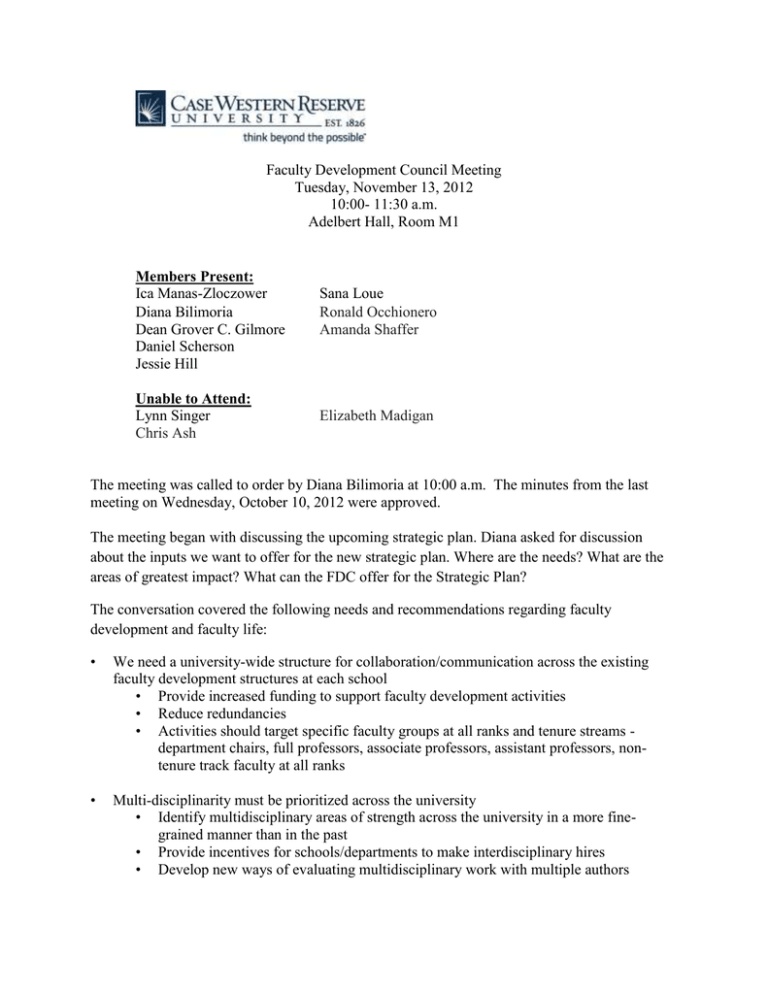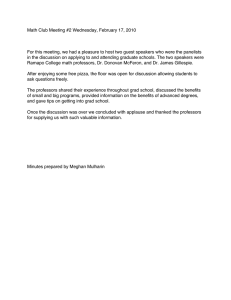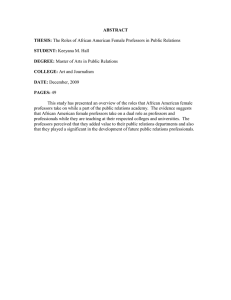Nov 2012 Minutes
advertisement

Faculty Development Council Meeting Tuesday, November 13, 2012 10:00- 11:30 a.m. Adelbert Hall, Room M1 Members Present: Ica Manas-Zloczower Diana Bilimoria Dean Grover C. Gilmore Daniel Scherson Jessie Hill Unable to Attend: Lynn Singer Chris Ash Sana Loue Ronald Occhionero Amanda Shaffer Elizabeth Madigan The meeting was called to order by Diana Bilimoria at 10:00 a.m. The minutes from the last meeting on Wednesday, October 10, 2012 were approved. The meeting began with discussing the upcoming strategic plan. Diana asked for discussion about the inputs we want to offer for the new strategic plan. Where are the needs? What are the areas of greatest impact? What can the FDC offer for the Strategic Plan? The conversation covered the following needs and recommendations regarding faculty development and faculty life: • We need a university-wide structure for collaboration/communication across the existing faculty development structures at each school • Provide increased funding to support faculty development activities • Reduce redundancies • Activities should target specific faculty groups at all ranks and tenure streams department chairs, full professors, associate professors, assistant professors, nontenure track faculty at all ranks • Multi-disciplinarity must be prioritized across the university • Identify multidisciplinary areas of strength across the university in a more finegrained manner than in the past • Provide incentives for schools/departments to make interdisciplinary hires • Develop new ways of evaluating multidisciplinary work with multiple authors Faculty Development Council Meeting Tuesday, November 13, 2012 Page 2 • Introduce a statement in Faculty Handbook about how we value and evaluate interdisciplinary work and collaborative work • We need an improved system for partner hiring and retention (dual career issues) • Current process does not always work because of lack of funding. • Partners may be academic or non-academic. • Look into forming a consortium with other local universities. But a caution should be that there must be language in any agreements which states that a candidate will be hired provided they have qualifications in that area. Language should also include recruitment and retention. • Create mechanisms/culture where a department can learn early about the need for partner hiring with a potential recruit. • Educate our faculty about partner supports • Women and minorities may be better benefited through partner hiring process • We need to prioritize innovative ways of diversifying our faculty • Reinstitute a financial incentive behind URM faculty hiring by creating a special fund across the university for this. • URM postdocs and graduate students need to be cultivated. A financial incentive should be provided to bring URM post-docs to CWRU and cultivate them to become assistant professors. • Create a consortium of URM postdocs and graduate students across regional research universities. • It would be beneficial to have a central resource or database which has lists of organizations and associations/societies across all disciplines for URM faculty hiring. • Provide start-up funds that are competitive for 1st tier candidates. • Incentivize departments to go forward and actively search/recruit diverse faculty • Monitor how department chairs/deans have increased faculty diversity on an annual and rolling 5-year basis • Continue the required non-discrimination training for all search committee members started last year • The University should provide training that increases the entrepreneurial nature of academic work in a multidisciplinary world • Faculty are basically small business owners yet they have no training in this • Provide training on skills to diversify funding sources • Encourage faculty to gain experience outside academia • We need better mechanisms for child care and elder care • On campus child care • Broader definitions of dependents Faculty Development Council Meeting Tuesday, November 13, 2012 Page 3 • We continue to need improved mentoring of pre-tenure faculty and associate professors along the lines recommended by the FDC last year • We should put money into retaining faculty and making their lives successful and stable, especially in schools dependent on research funding that is shrinking • We need to improve infrastructure and facilities for lab courses at the university • Succession planning is needed for department chair positions. Diana then invited continued discussion about the faculty development needs of full professors. Discussion centered around the following points. • Many full professors put off retirement because of benefits. • An additional semester can be given to any faculty member who may have lost funding to get their research back on track - a bridge to re-engage faculty into the research track. • Better metrics for evaluation (of teaching, scholarship, service, etc.) would be helpful for all full professors. It should be clear what is expected if a faculty member wants a raise. For example through a process of consensus, agreement could be reached about minimum performance standards. This quantifies what is expected of a faculty member. • Development needs of an “engaged” professor are primarily about recognition. • Recognition by peers (e.g., to be featured on the CWRU website) • We should implement service awards for faculty on and off campus • Leadership award • Acknowledgement of when someone gets funded • Some professors feel that advancements in their field have passed them by • A potential revitalization tool is opportunity grants for mini-sabbaticals. Shorter time frames could be carved out for specific projects. • Sometimes internal grants for full professors are limited, since much more attention is given to assistant professors. • In engineering there is a pilot program for 3rd year post-tenure review process (everything except external letters). Participants can be up to 6 years post-tenure. Goals and aspirations for career development are encouraged. This program will be implemented this year. Meeting adjourned at 11:30 a.m. Minutes by Elise Johnson, elise.c.johnson@case.edu or (216) 368-2464.

